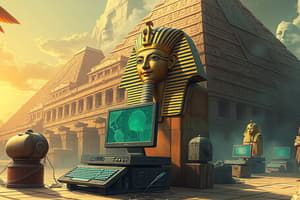Podcast
Questions and Answers
In which ancient civilizations was the abacus used?
In which ancient civilizations was the abacus used?
- Mesopotamia and Babylon
- Early Greek and Roman (correct)
- Persia and India
- Egypt and China
Who envisioned machines that would print results of computations on paper?
Who envisioned machines that would print results of computations on paper?
- Blaise Pascal
- Gottfried Wilhelm Leibniz
- Charles Babbage (correct)
- Herman Hollerith
What represented data in the machines developed by Pascal and Leibniz?
What represented data in the machines developed by Pascal and Leibniz?
- Mechanical levers
- Electrical impulses
- Punched cards
- Gear positioning (correct)
What was the outcome of Herman Hollerith's work in the 1890 U.S. census?
What was the outcome of Herman Hollerith's work in the 1890 U.S. census?
In which century did the quest for more sophisticated computing machines begin?
In which century did the quest for more sophisticated computing machines begin?
How were output results achieved in Pascal's and Leibniz's machines?
How were output results achieved in Pascal's and Leibniz's machines?
What was the purpose of Herman Hollerith's punch cards?
What was the purpose of Herman Hollerith's punch cards?
Which of the following inventors did not work with gear technology?
Which of the following inventors did not work with gear technology?
What was the major advancement that overcame the cost barrier of producing complex machines?
What was the major advancement that overcame the cost barrier of producing complex machines?
What was the name of the machine developed by John Mauchly and J.Presper Eckert?
What was the name of the machine developed by John Mauchly and J.Presper Eckert?
What was the occupation of Howard Aiken and a group of engineers?
What was the occupation of Howard Aiken and a group of engineers?
What was the approximate cost of ENIAC?
What was the approximate cost of ENIAC?
What was the weight of ENIAC?
What was the weight of ENIAC?
What was the unit of storage in a computer?
What was the unit of storage in a computer?
What is coded as a pattern of 0 or 1 in a computer?
What is coded as a pattern of 0 or 1 in a computer?
What is the short form of 'Binary Digits'?
What is the short form of 'Binary Digits'?
Study Notes
Roots of Computing
- The abacus is one of the earliest computing devices, originating in ancient China and used in ancient Greece and Rome.
- The abacus consists of beads strung on rods mounted in a rectangular frame.
Technology of Gears
- In the post-Medieval era, inventors like Blaise Pascal, Gottfried Wilhelm Leibniz, and Charles Babbage experimented with gear technology for computing machines.
- These machines represented data through gear positioning, with data entered mechanically by establishing initial gear positions.
Punch Cards
- Herman Hollerith developed the concept of representing information as holes in paper cards, used in the 1890 U.S. census, which led to the creation of IBM.
- Punch cards survived as a popular means of communicating with computers until the 1970s.
Mechanical-driven to Electronics-driven machines
- Advances in electronics in the early 1900s enabled the production of cost-effective gear-driven machines.
- Examples include George Stibitz's electromechanical machine (1940) and the Mark I (1944), which used electronically controlled mechanical relays.
ENIAC
- ENIAC (Electronic Numerical Integrator and Calculator) was developed by John Mauchly and J. Presper Eckert at the University of Pennsylvania.
- ENIAC specifications include:
- Occupying 1800 square feet
- Using 20,000 vacuum tubes, 1500 relays, 10,000 capacitors, and 70,000 resistors
- Consuming 200 kilowatts of electricity and weighing 30 tons
- Costing $487,000 (approximately PKR 62.5 million)
Rapid Advancement
- Following ENIAC, there was rapid advancement in computing, marked by:
- Transistors
- Integrated Circuits
- Size reduction
- Processing power doubling every two years
- The introduction of desktop computers (1976) and IBM PCs (1981)
- The development of the web and smartphones
Bits
- In computing, all information is stored in bits, the basic unit of storage.
- A bit is a binary digit that can have only one value: 0 or 1.
Studying That Suits You
Use AI to generate personalized quizzes and flashcards to suit your learning preferences.
Description
This quiz explores the early computing devices, including the Abacus and its history, and the development of mechanical gears that led to electronic machines.




